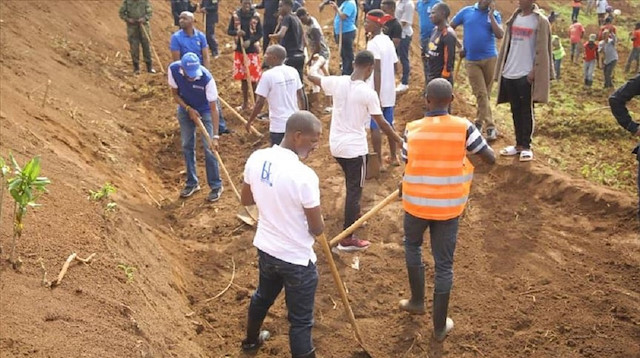
Hundreds of Rwandans took part Saturday in the last nationwide monthly community work of the year.
Residents braved cold weather and gathered at 8 a.m. local time with spades and hoes for community work commonly called Umuganda.
The gatherings had its lowest turnout in several months, with many in Christmas and New Year celebratory mood.
They dug trenches and cleared water drainages to mitigate effects of natural disasters after heavy rains in December killed a number of people.
Rwanda institutionalized Umuganda in 2009 and it is backed by Rwandan law that states every person, including non-citizens between 18 and 65 years old are supposed to take part.
It takes place on the last Saturday of the month.
Failure to participate with tangible reason can incur a fine of Rwf5,000 or $5.40.
During Umuganda, businesses and offices remain closed from 8 a.m. to 11 a.m. to allow citizens to participate in the cleaning exercise which has earned the Rwandan capital of Kigali the title as the cleanest and green city in Africa.
Though the majority participate, some citizens, especially those in cities where it is harder to keep track, are excused because they are caring for children or ill. But others simply stay away until 11 a.m. when normal business and movements resume.
This community work Saturday was dedicated to environment conservation and disaster preparedness activities.
Water trenches were dug along feeder roads and on hilly slopes.
There was also construction of terraces to prevent soil erosion as well as construction of houses for persons evacuated from areas regarded as high risk zones around in Kigali and other areas.
Floods triggered by heavy rains last Wednesday killed at least 12 people and destroyed more than 100 homes.
The government recently evacuated 3,600 citizens from wetlands in Kigali and hilly high risk areas countryside. But the evacuations left many homeless.
The government gave evictees money to rent houses in designated settlements for three months but some decided to spend nights outside in apparent protest.
Some refused to move from their former homes that were demolished by law enforcement.
Heavy rains also washed away vehicles parked in garages in parts of Kigali.
Main access roads in Kigali, including Kimisagara-Nyabugogo, City Center-Kanogo-Kimihurura and others were blocked by floods.
The Minister of Local Government Anastase Shyaka said:
“This [Saturday] Umuganda focuses on addressing and preventing disasters in districts which were affected. Activities include construction of houses and toilets for the vulnerable, rehabilitating schools, roads and working on water trenches, bridges and filling potholes."
In Musanze and Gasabo districts, residents joined leaders on hilly slopes to construct terraces to prevent soil erosion.
In Nyagatare and Rwamagana districts, citizens focused on rehabilitating facilities destroyed by rains and constructed homes for the vulnerable and residents evacuated from high risk zones.
For citizens, community work does not only address the problem of natural disasters but also improve greenness and beauty of the community, especially after clearing bushy hills used as hiding ground for thugs and drug addicts.
“We used to have thugs hide in the bushes around hills in our area which made certain places impassable at night because of the risks of being mugged, robbed or even killed at times," 69-year-old Gerald Rutagarama, a resident of Rusororo, in Gasabo district told Anadolu Agency.
Rutagarama is one of the hundreds of residents who picked up hoes to clear one hectare on Rusororo hills where there are plans to plant more than 4,000 fruit trees to replace the bushes.
Jean Marie Vianney Uwihoreye, Gasabo area agronomist, said such special Umuganda focused on environmental protection on 10 hectares, have several values to the community.
"We will have solved the problem of soil erosion and landslides, creating an opportunity of growing fruits to improve feeding, but also add green beautification to the hills,” said Uwihoreye.
On each of the hectares local officials say they will plant mangoes and oranges trees which will be sold at cheaper prices to the community after harvesting.
“The proceeds will be used to support the vulnerable and poor communities in the sector, as part of a sustainable plan,” Uwihoreye added.
Umuganda, remains one of Rwanda’s tradition of community work and one of its homegrown solutions that continues to impact the lives of many Rwandans and significantly contribute to national development.
Official statistics show that voluntary activities save the country at least Rwf20 billion annually, through Umuganda.
However, last year the Senate recommended a review of the Umuganda policy especially on fines, recommending the policy focuses on encouraging citizen participation.














